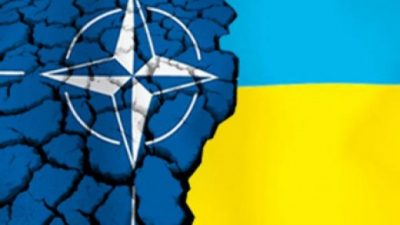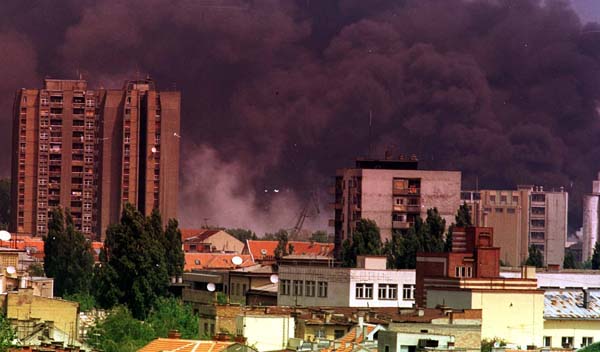The American academic and author John J. Mearsheimer outlined that “the taproot of the current [Ukrainian] crisis is NATO expansion and Washington’s commitment to move Ukraine out of Moscow’s orbit and integrate it into the West”. Mearsheimer claimed that the Russian president Vladimir Putin saw such an act as “a direct threat to Russia’s core interests”.
Putin’s viewpoint is hardly unrealistic as the Ukraine, a country almost twice the size of Germany, lies along a vast stretch of Russia’s western border. Almost 30% of the Ukraine’s population of 45 million speak Russian as their native language, with much of those residing in the country’s eastern half. The historical ties between the neighbors run deep. In 1922, Russia and the Ukraine were the Soviet Union’s founding members, and were later the signatories of the treaty that ended the decaying socialist state in the early 1990s.
During the Second World War, a remarkable seven million Ukrainians fought in the Moscow-led Soviet Army, which performed the leading role in ridding the world of Nazism. By war’s end, about half of the seven million Ukrainian soldiers were killed by Hitler’s forces. Much of them fought through the liberation of their birth nation, which had been overrun by the Nazis in the second half of 1941 – the capital Kiev was retaken by Christmas 1943 after weeks of bloody fighting.
Elsewhere, while Russia (and China) face rising provocations, the United States itself does not permit hostile powers to establish military forces anywhere in the Western hemisphere, let alone near its frontiers. Were a rival entity to direct its naval crews towards the Atlantic and across to the Caribbean Sea, they would face certain annihilation. Also terminated would be any efforts to overthrow governments in Canada or Mexico.
America’s historical military standpoint goes even further than that. The Monroe Doctrine of 1823, which outlined complete US dominance of the Western hemisphere, also does not tolerate any “successful defiance” of the superpower. The doctrine was first expounded by James Monroe, America’s fifth president (1817-1825) and Founding Father.
In the early 19th century, such an imperialist creed could not yet be carried forward as England remained the world’s dominant force – with other imperial powers such as Portugal and Spain still holding some clout. In the post-World War II era, as America became the undisputed global power, the Monroe Doctrine has been ruthlessly implemented. Any nation that rears its head, demonstrating “successful defiance”, is subjected to the “terrors of the earth” as written by Arthur Schlesinger Jr., president John F. Kennedy’s Latin American adviser.
Schlesinger was referring to the terrorist war the US unleashed on revolutionary Cuba (Operation Mongoose), which included the demolition of Cuban petrochemical plants, poisoning of livestock and food crops, destruction of ships, shelling of hotels [with Russian visitors present], and much else. Such was Cuba’s punishment for its simple defiance of the superpower, with little of these terrorist acts ever up for discussion in mainstream circles.
While America enjoys complete security, Russia is afforded no such luxury. For example, the world bore witness to this in February 2014, with the overthrow of a democratically elected government in the Ukraine. It was an especially severe provocation of Russia, which Putin lambasted as “unconstitutional” and a “coup d’etat”, in which his country was “rudely and insolently cheated” by the US.
The following year, Barack Obama admitted America’s “transition of power” in the Ukraine, where president Viktor Yanukovych was illegally ousted and a highly corrupt billionaire replaced him, Petro Poroshenko. Criticism of Poroshenko is a rare thing indeed in the dominant Western media.
Meanwhile, the US has no compunction in instituting their own forces on the very borders of rival powers. Just last year, thousands of NATO troops were deployed to countries near or along Russia’s frontiers (like Estonia and Latvia) – which Moscow officials claim is the largest build up of hostile forces “since the Second World War”. Understandably, Russia takes the provocations seriously, as the country has been invaded repeatedly throughout its history.
The threats are indeed remarkably close to home. The northern section of Estonia’s border is only a few dozen miles from St Petersburg, one of the major Russian cities. Such aggressive expansionism clearly increases the risk not only of regular warfare breaking out, but also nuclear war. NATO powers such as the US, Britain and France possess nuclear arsenals, as does Russia on the other side.
The atomic scientists who set the Doomsday Clock once more advanced the apocalyptic instrument in January, citing specifically “the failure of Donald Trump and other world leaders to deal with the looming threat of nuclear war… to call the world’s nuclear situation dire is to understate the danger and its immediacy”.
Drumming up tensions to the very boundaries of Russia is unwise, to say the least. The US strategic planner George Kennan said previously that NATO’s expansion to Russia’s sphere of interest “would make the Founding Fathers of this country [America] turn over in their graves”.
In the post-Soviet Union era, despite the collapse of NATO’s official pretext for existence (countering “Soviet aggression”), the military alliance has been transformed into a global operation led by the US, easily its largest financial contributor. Another of NATO’s key tasks is to protect “crucial infrastructure” of the West, such as pipelines, sea lanes and other energy systems, and to prevent them falling into unwanted hands.
NATO’s scope has also broadened into an intervention force, again under American auspices – one of the most glaring examples was the massive bombing campaigns against Yugoslavia in the late 1990s, during the Kosovo War.
The Canadian author and former politician, Michael Ignatieff, noted that the true reason for the NATO attack “was not [Slobodan] Milosevic’s human rights violations in Kosovo”, but instead,
“What mattered most was the need to impose NATO’s will on a leader whose defiance, first in Bosnia and then in Kosovo, was undermining the credibility of American and European diplomacy, and of NATO’s willpower”.
Andrew Bacevich, the US international relations historian, was even more scathing, expressing that the
NATO bombings were “not, as claimed, to put a stop to ethnic cleansing or in response to claims of conscience – but to preempt threats to the cohesion of NATO and the credibility of American power”.
The NATO attacks on Yugoslavia lasted for a staggering 78 successive days (March-June 1999), killing many hundreds of people – including three Chinese journalists who lost their lives after NATO bombed China’s embassy in Belgrade, bitterly denounced by the country’s then UN ambassador, Qin Huasan, as a “barbarian act”.
Again, the real purpose for the attacks was as Bacevich highlights, “to provide an object lesson to any European state fancying that it was exempt from the rules of the post-Cold War era”. Bacevich notes that from the outset of NATO’s invasion “the war’s architects understood that its purpose had been to sustain American primacy” in Europe.
Europe must be kept under the realm of US control, another of NATO’s functions, as increasing numbers of weak-willed leaders designate their countries as part of the organization (10 nations so far this century).
NATO’s murderous assaults on Yugoslavia (and Afghanistan, Libya, etc.) revealed the underlying commitment to “human rights concerns” of leaders such as Bill Clinton and Tony Blair – and many other Western figureheads before and after them. Indeed, the above is a perfect microcosm of American-led foreign policy in the post-World War II era: hegemony and destruction over democracy and human rights.
Militaristic policies are time and again pursued ahead of diplomatic possibilities. This can be witnessed elsewhere with US military exercises in the Korean peninsula, along with huge American forces situated around the seas off nuclear-armed China’s coast.
*
Shane Quinn obtained an honors journalism degree. He is interested in writing primarily on foreign affairs, having been inspired by authors like Noam Chomsky. He is a frequent contributor to Global Research.
by Michel Chossudovsky
Available to order from Global Research!
ISBN Number: 978-0-9737147-5-3
Year: 2012
Pages: 102
Print Edition: $10.25 (+ shipping and handling)
PDF Edition: $6.50 (sent directly to your email account!)
Michel Chossudovsky is Professor of Economics at the University of Ottawa and Director of the Centre for Research on Globalization (CRG), which hosts the critically acclaimed website www.globalresearch.ca . He is a contributor to the Encyclopedia Britannica. His writings have been translated into more than 20 languages.
Reviews
“This book is a ‘must’ resource – a richly documented and systematic diagnosis of the supremely pathological geo-strategic planning of US wars since ‘9-11’ against non-nuclear countries to seize their oil fields and resources under cover of ‘freedom and democracy’.”
–John McMurtry, Professor of Philosophy, Guelph University
“In a world where engineered, pre-emptive, or more fashionably “humanitarian” wars of aggression have become the norm, this challenging book may be our final wake-up call.”
-Denis Halliday, Former Assistant Secretary General of the United Nations
Michel Chossudovsky exposes the insanity of our privatized war machine. Iran is being targeted with nuclear weapons as part of a war agenda built on distortions and lies for the purpose of private profit. The real aims are oil, financial hegemony and global control. The price could be nuclear holocaust. When weapons become the hottest export of the world’s only superpower, and diplomats work as salesmen for the defense industry, the whole world is recklessly endangered. If we must have a military, it belongs entirely in the public sector. No one should profit from mass death and destruction.
–Ellen Brown, author of ‘Web of Debt’ and president of the Public Banking Institute
The original source of this article is Global Research







/https://www.niagarafallsreview.ca/content/dam/thestar/news/canada/2021/09/25/huawei-executive-meng-wanzhou-receives-warm-welcome-upon-return-to-china/_1_meng_wanzhou_2.jpg)













No comments:
Post a Comment
Note: Only a member of this blog may post a comment.